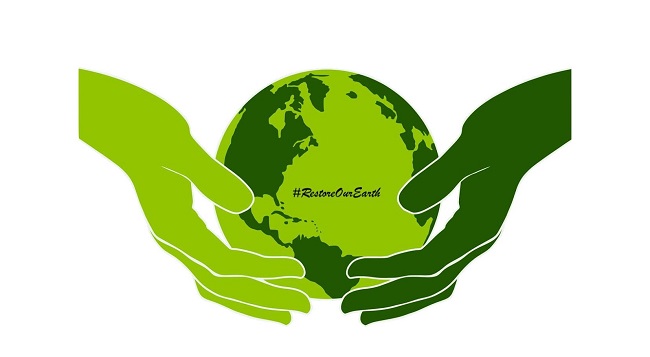World Earth Day is an annual event celebrated globally on April 22. It is a day that reminds us of the significance of our planet and the need to take action to protect it. The first Earth Day was celebrated in 1970, and since then, it has become a platform for raising awareness about environmental issues and advocating for sustainable practices.

World Earth Day 2023 marks the 53rd anniversary of this globally recognised day that promotes environmental awareness and action. The theme for this year’s Earth Day is “Restore Our Earth,” which emphasises the importance of restoring the natural balance of our planet’s ecosystems to combat the ongoing climate crisis and preserve the diversity of life on Earth.
It includes protecting and restoring forests, wetlands, and other natural habitats, reducing carbon emissions, and promoting sustainable practices in agriculture and industry. Restoring our planet’s ecosystems is essential for maintaining the balance of nature and preserving biodiversity. The loss of biodiversity is a critical issue that threatens the health of our planet and our own survival.
It is estimated that one million plant and animal species are at risk of extinction due to human activities, such as deforestation, habitat destruction, and pollution. This year’s celebration is a reminder that we all have a role to play in protecting the environment, and we must act now to ensure a sustainable future for generations to come.
Restoring the Earth’s planet ecosystems requires a multifaceted approach, including collective action at all levels, from individuals to governments, corporate and international organisations. Individuals and governments can contribute to restoring our planet’s ecosystems in several ways including:
- Protection and restoration of natural habitats: Governments can protect and restore natural habitats such as forests, wetlands, and coral reefs by designating them as protected areas. Individuals can support these efforts by participating in conservation programmes and supporting organisations that work to protect these areas.
- Reduction of carbon emissions: Carbon emissions are a major contributor to climate change, which poses a significant threat to our planet’s ecosystems. Governments can reduce carbon emissions by investing in renewable energy sources such as wind and solar power, promoting energy efficiency, and implementing policies that encourage the use of electric vehicles. Individuals can reduce their carbon footprint by using public transportation, reducing energy consumption, and supporting renewable energy initiatives.
- Promotion of sustainable agriculture: Agriculture is a major driver of habitat destruction and biodiversity loss. Governments can promote sustainable agriculture practices that minimise the use of pesticides and fertilisers, protect soil health, and reduce water use. Individuals can support sustainable agriculture by buying locally produced food, and growing their own food using sustainable practices.
- Waste reduction: Globally, waste generation is a significant environmental problem that contributes to pollution and habitat destruction. Governments can promote waste management by implementing policies that stimulate recycling, composting, and waste reduction. Individuals can reduce their waste by recycling, composting, and reducing their use of single-use plastics.
- Support biodiversity conservation: Biodiversity conservation is critical for maintaining the balance of nature and preserving ecosystems. Governments can support biodiversity conservation by designating protected areas, implementing laws and policies that protect endangered species, and promoting education and awareness about biodiversity. Individuals can support biodiversity conservation by supporting organisations that work to protect endangered species and their habitats.
As we celebrate this year’s World Earth Day, here are 10 things you can do each day to make our planet a healthier place for future generations:
- Reduce your carbon footprint: Reduce your energy consumption by turning off lights and appliances when not in use, using energy-efficient light bulbs, and using public transportation or carpooling instead of driving alone.
- Plant a tree: Trees play a critical role in absorbing carbon dioxide and producing oxygen. By planting a tree, you can help mitigate the effects of climate change and promote biodiversity.
- Reduce your waste: You can reduce your waste by recycling, composting, and using reusable bags, containers, and water bottles.
- Clean up litter: Participate in a community cleanup or pick up litter in your residential quarters, schools, roads, parks or neighborhood. Litter can harm wildlife and contribute to pollution.
- Use eco-friendly products: Use eco-friendly products such as biodegradable cleaning products, reusable straws, and cloth napkins.
- Reduce water usage: Conserve water by taking shorter showers, fixing leaks, and installing low-flow toilets and showerheads.
- Support local farmers and businesses: Supporting local farmers and businesses reduces the carbon footprint associated with transportation and supports sustainable practices.
- Support conservation organisations: Support organisations that work to protect endangered species and their habitats, and promote biodiversity conservation.
- Educate yourself and others: Learn about environmental issues and share your knowledge with others. Attend a local environmental event or join an environmental organisation to make a difference in your community.
- Advocate for policy change: Contact your elected officials and advocate for policies that support renewable energy, protect natural habitats, and promote sustainable practices.
These are just a few ideas of things we can do on Earth Day to protect our planet. Remember, every action counts, and we can all make a difference in creating a more sustainable future. World Earth Day 2023 provides us with an opportunity to reflect on our relationship with the planet and take action to restore its ecosystems. By working together, we can restore the natural balance of our planet’s ecosystems and ensure a sustainable future for generations to come. Let us make every day an Earth Day.
By Prof. Nsikak Benson, @nplusbe
